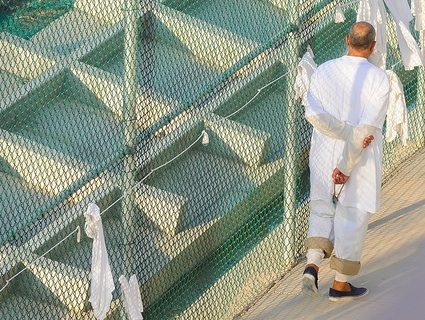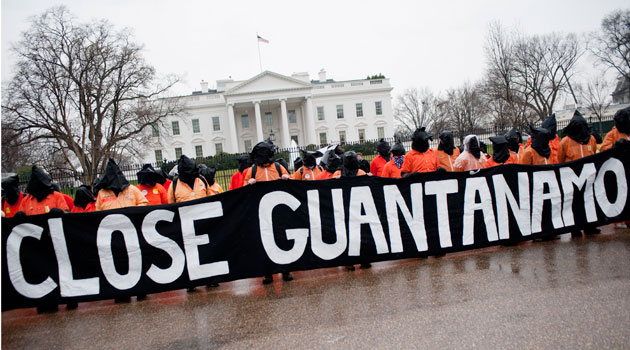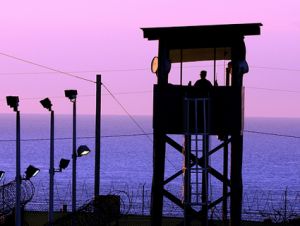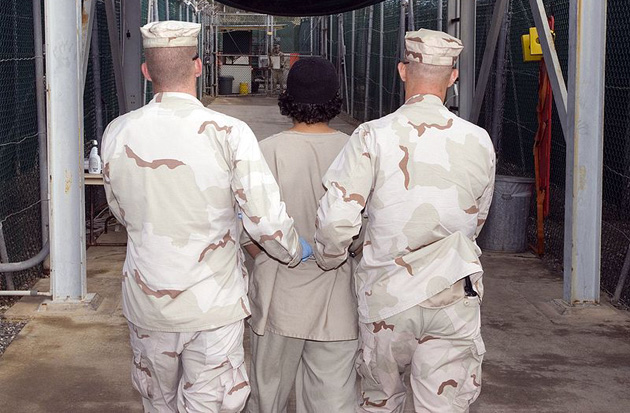“It’s not a surprise to me that we are having problems at Guantanamo,” President Obama said on Tuesday, reiterating that the prison needs to be closed. It makes cooperation with allies more difficult, he said, also noting that Guantanamo is unsafe and too expensive. “I am going to go back at this,” he said, “I am going to reengage with Congress that this is not in the best interest of the American people.”
America’s so-called war on terror has always been fundamentally flawed. Even the invasion of Afghanistan, which struck many as a sensible response to 9/11, felt like the beginning of something terrible: a war against an idea, rather than a global crime-fighting effort against a particularly ruthless organized crime organization. The notion that waging a war could put an end to the phenomenon of terrorism has always been naive, and it’s left many innocents dead in its wake.
One side effect of this never-ending war has been our nation’s collective failure in our definition of justice. Fear and the desire for revenge have given rise to everything from the Patriot Act to warrantless wiretapping to state-sanctioned torture. When the surviving suspect in the Boston Marathon bombing was captured, you couldn’t spend more than five minutes watching Fox News before someone would begin lamenting the fact that the bomber has Miranda rights, or demanding that he be sent to Guantanamo Bay rather than face trial on US soil.
Is our justice system so frail that trying a terrorist here at home would somehow threaten the very foundation of our society? What existential risk is there in giving a suspect in a terrorism case the same due process and rights given every other suspect in a criminal case? Do we distrust our courts so much that we must hand over this fiat to our military?
Justice is precious. It makes civilization possible. And usually we start abandoning it when we drag out the word “war” to describe things that aren’t, or shouldn’t be, considered war at all. (The “war on drugs” is another.)
War is the opposite of civilization. That may be a crude duality, but that’s how I like to think of it. Where one sets out to build prosperity and preserve life, the other tears it down, regardless of the cause. There may be “just wars”—but even a just war can leave a people scarred and defeated. And while the international community has set up some clear rules on how war ought to be conducted, the nature of war itself goes against rules or international ethics guidelines. War is rarely about justice, and even the “good guys” in a conflict will often find themselves participating in unthinkable horrors. The Civil War is widely perceived as a just war (or at least a necessary step in ending slavery) but it was filled with death and destruction and many of its victims were innocents.
Over the past decade, we’ve discovered something about ourselves. Our troops have carried out torture in the name of security and vengeance. We’ve locked up hundreds of suspected terrorists in Guantanamo Bay, many of whom are now on hunger strike, and refused them due process because we’re more concerned with security than we are with justice. What we forget is that the two are inextricably linked. Without adequate justice for all, how can we ever hope to protect what we hold dear? We’ll lose the war on terror by abandoning our principles and values faster than we will on the battlefield. If the terrorists really do “hate our freedom,” as many conservatives have suggested, why are we so willing to assist them in the destruction of it?
I watch the talking heads on Fox and elsewhere complaining about the tenets of our justice system when applied to “bad guys” and I realize what their problem is: They are cowards. They’re liars, too: invoking the Constitution as though it were scripture, but then editing out the parts they dislike when its useful to their agenda. They sling stones at all those dreadful liberals, at the president, at some fictional legion of anti-patriots who want to “apologize for America,” and in the same breath they advocate policies which gut many things about this country that, in theory at least, really do make it great. They loudly proclaim that we’re the greatest country on the face of the earth, nay in the history of mankind, and then they push the hideous notion that the only way to keep us on top is to essentially do away with all of it. (All of it, that is, except our right to own guns.)
The only reason to keep Guantanamo Bay open is because we’re afraid, because we care more about a false sense of security than we do about our values and, dare I say it, our Constitution. Every day we fail to close Gitmo down is a day we admit that the terrorists have already won. It’s a moral failing we may not recover from for a very long time.
When Roosevelt said that the only thing to fear was fear itself, he defined it as a “nameless, unreasoning, unjustified terror which paralyzes needed efforts to convert retreat into advance.” It was a rallying cry for a war effort. Maybe this time around we can use it as a call to a different kind of advance—toward what is right, even though there will be more moments when we will face “nameless, unreasoning, unjustified terror.”
















